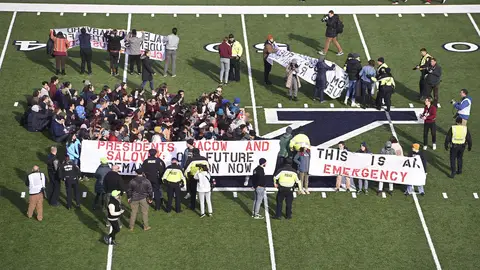Hundreds Of People Stormed The Harvard-Yale Football Game — And They Had Players' Support

A legacy showdown between rivals turned into something more on Saturday (November 23), when hundreds of activists disrupted the Harvard v. Yale football game in New Haven, Connecticut. Forty-two people were eventually arrested, the Associated Press reported, but not before making their demands heard: For both schools to divest from fossil fuel industries, as well as debt levied against Puerto Rico, as part of their collective $70 billion endowment.
The face-off between the Ivies is known colloquially as The Game; according to the Harvard Crimson, it has been held for 136 years. The groups Fossil Free Yale, Fossil Fuel Divest Harvard, and the Yale Endowment Justice Coalition spearheaded the efforts; per the AP, around 150 students initially planned to storm the football field at Yale Bowl during halftime, and over 100 more joined in once the protest kicked off. Activists also decried the treatment of Uighur Muslims in China, the Yale Daily News reported, and shouted "This is what democracy looks like!" and "OK boomer." All told, the second half of the game was delayed by around 40 minutes, according to the Connecticut Post.
In a statement to the Yale Daily News, Yale University spokesperson Karen Peart said that while the school is "firmly for the right to free expression," such expression is "subject to general conditions," and does not include disruption of university events.
"We stand with the Ivy League in its statement that ‘It is regrettable that the orchestrated protest came during a time when fellow students were participating in a collegiate career-defining contest and an annual tradition when thousands gather from around the world to enjoy and celebrate the storied traditions of both football programs and universities,’" she said.
But such disruption was entirely the point, Harvard sophomore Ilana Cohen told Teen Vogue. "The entire concept of The Game — this mock, sensationalized, ivy league rivalry between Harvard and Yale — really brings to light the kind of privilege these universities have, and that’s a privilege that has to be used in a responsible way," she said.
Vox notes that Harvard's endowment is the largest in the world; it is not immediately clear how much of its $39.2 billion, or of Yale's $29.4 billion, is directly connected to the fossil fuel industry, or any other industry with a direct impact on the climate crisis. In 2018, the Intercept reported that Harvard had a $2 billion commitment with the Baupost group, a hedge fund that holds a large amount of the debt levied against Puerto Rico; though Harvard students protested the school and urged a divestment that year, it is not clear if the school heeded the call.
That secrecy isn't acceptable to activists, whose #NobodyWins platform includes challenging the universities to "fully disclose, divest, and reinvest their holdings in the fossil fuel industry, putting an end to business as usual and taking meaningful action towards building a more just and stable future."
"To continue watching football games, kicking back, and perpetuating an unsustainable and fundamentally unethical status quo is something that we really wanted to grapple with and bring to light at this game through our actions," Cohen, a co-lead coordinator of Fossil Fuel Divest Harvard, explained. "Because ultimately, achieving fossil fuel divestment and achieving transformative justice…requires disrupting the status quo, and revealing the flaws that are inherent within the system."
In a video posted to Twitter, Harvard Crimson football captain Wesley Ogsbury, a senior at the school, noted that a number of his teammates, as well as players for the Yale Bulldogs, would wear wristbands in solidarity with the movement. "Both of our institutions continue to invest in the industries destroying our futures," he said in the video. "Harvard and Yale can’t claim to truly promote knowledge while at the same time supporting the companies engaged in misleading the public, smearing academics and denying the truth."
In September, the University of California system announced it would divest from fossil fuels; it had previously invested $150 million of its $70 billion pension and $13.4 billion endowment in publicly-traded companies dealing in fossil fuels. At the time of the announcement, UC chief investment officer Jagdeep Singh Bachher credited the shift to UC students, who had protested for years: "The students were the first early warning system for us," he said.





